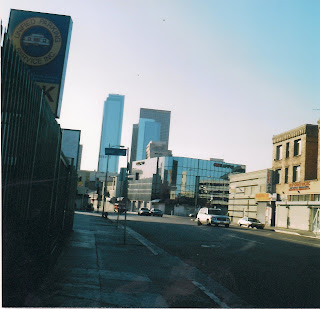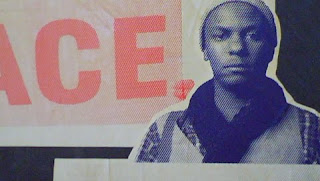 Los Angeles is a plague. A City of such poetic catastrophe and virus, such beautiful decay, such a powerful evocation of Forgetfulness, but a plague nonetheless; a city that struggles to thrive though the Post-Future Dream Machines its connected to desperately strums the threads of Fate. There is very little density to this city and I'm always amazed at how moderately anti-pedestrian its streets and public places are; how non-intuitive our urban planning and architecture, in reality, is. We fight against this public density, pushing it away, scorning it in favor of beautification (which really means the strategy of "sub-urban-izing" the City by eliminating diversity).
Los Angeles is a plague. A City of such poetic catastrophe and virus, such beautiful decay, such a powerful evocation of Forgetfulness, but a plague nonetheless; a city that struggles to thrive though the Post-Future Dream Machines its connected to desperately strums the threads of Fate. There is very little density to this city and I'm always amazed at how moderately anti-pedestrian its streets and public places are; how non-intuitive our urban planning and architecture, in reality, is. We fight against this public density, pushing it away, scorning it in favor of beautification (which really means the strategy of "sub-urban-izing" the City by eliminating diversity). We tend to forget that Cities are a mass human effort that involves everyone: poor, working poor, homeless, mentally insane, working class, middle class and upper class. The more we attempt to "purify" our Cities (via implementation of wider streets for public transportation, usually at the expense of pedestrians or forcing though design, renovation and planning, the "undesirables" from its stable environments to the outskirts) we get outstanding vistas of empty streets and city views and little to no social interaction. Los Angeles doesn't know how to survive after 6pm
We tend to forget that Cities are a mass human effort that involves everyone: poor, working poor, homeless, mentally insane, working class, middle class and upper class. The more we attempt to "purify" our Cities (via implementation of wider streets for public transportation, usually at the expense of pedestrians or forcing though design, renovation and planning, the "undesirables" from its stable environments to the outskirts) we get outstanding vistas of empty streets and city views and little to no social interaction. Los Angeles doesn't know how to survive after 6pm Its streets become hazardous and empty and viral and beautiful. Abandoned. Pockets of life will persist but the plague still slowly ravishes the body of my City. Instead of architects masturbating in digital space with design that affront the senses or catering to the ego-centric industrialist/co-operation, brand-monopoly or well-to-do, maybe we can start by re-examining our methodology and the various ways we think about the human body and its need for shelter;
Its streets become hazardous and empty and viral and beautiful. Abandoned. Pockets of life will persist but the plague still slowly ravishes the body of my City. Instead of architects masturbating in digital space with design that affront the senses or catering to the ego-centric industrialist/co-operation, brand-monopoly or well-to-do, maybe we can start by re-examining our methodology and the various ways we think about the human body and its need for shelter;
starting from the psycho-economics of shelter to the social need of the built environment, to understand the various forces involved in how strangers use the built environment and the political processes that cater to institutionalizing the systems that we use to orchestrate our daily lives. Instead of endless sprawl, fenced communities and the inefficient use of transportation, maybe a programme of Proto-Urbanism---a candid view of how are Cities really function and strategies to enhance those functions through design: parking, walking, entertainment, shops, etc.,). Flaws will exist as the shift from old to young and the shift of ideologies ensue, but that's part of human nature and since Cities are fundamentally a product of human nature, it must be allowed to fail and succeed, to experiment and stabilize or disrupt and displace. If these elements are not in play, the City becomes a ghost town.
Los Angeles is a plague. A beautiful catastrophe that needs to be understood.




